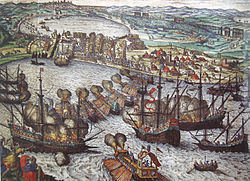| Years |
|---|
| Millennium |
| 2nd millennium |
| Centuries |
| Decades |
| Years |


| 1535 by topic |
|---|
| Arts and science |
| Leaders |
| Birth and death categories |
| Births – Deaths |
| Establishments and disestablishments categories |
| Establishments – Disestablishments |
| Works category |
Year 1535 ( MDXXXV ) was a common year starting on Friday of the Julian calendar.



